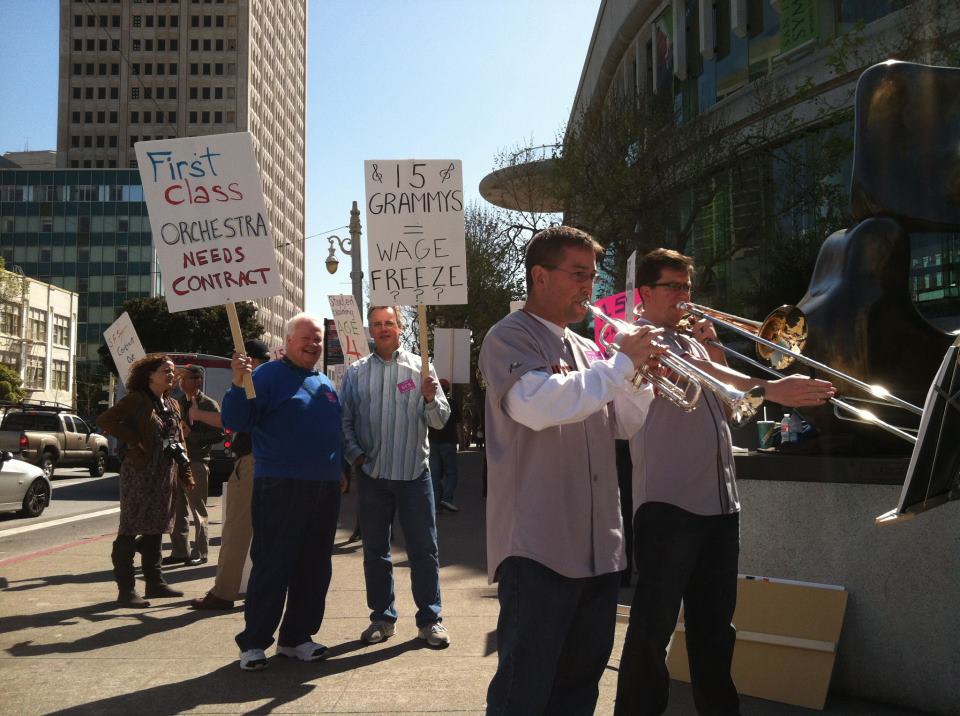A Question of Values
Many of us have been closely following the strike of the San Francisco Symphony, but the clamor of critics accusing the musicians of being unreasonable in their demands has gone largely unheard. Until now, that is. On March 18th, San Francisco resident, musician, and minister Melinda McLain posted a poignant and deeply heartfelt response to these negative reactions on her blog, questioning why a striking musician making $165,000 a year is considered to be arrogant while it’s perfectly acceptable for the actual executives in the industry to “rake in the dough.” McLain acknowledges that classical music “is not a money-making enterprise,” but then asks a seemingly obvious question: “Why don’t we value those who live their life in service to music as much as those who simply spend time trying to sell us another thing that we don’t really need?” Altogether, the piece poses some important questions for musicians and non-musicians alike, and is well worth a read. I’ve included the full text below.
From the Top
by Melinda McLainThese past few days, I have found myself increasingly depressed and angry over the general reaction to the strike by the musicians of the San Francisco Symphony. I have observed via social media and in person a variety of people refer to these top flight musicians as “whiners” because they make @$165,000 per year. Such comments are usually followed by, “I wish I made that much money.”Well, you might if you were at the TOP of your profession, although in virtually every other profession, you would probably make much more than that for being the very best at what you do. Mid-level managers make more than that in high-tech companies. Government bureaucrats running small agencies at San Francisco City Hall make more money than these highly-skilled and extraordinarily-gifted musicians. In San Francisco, LOTS of people make more than that who are not the very best of their profession.
Yep, $165,000 per year is all they get to be at the TOP of their profession. Yep, that’s the BEST you can do if you are a musician committed to playing classical music in an ensemble. Now, if you are the executive director of the symphony, your salary will be north of $500,000 (media reports vary) and his pay is regularly augmented by bonuses while the musicians are not even being offered a contract that includes raises for cost-of-living. And music director Michael Tilson Thomas receives at least $2.4 million per year and is rarely in town because he is off conducting other orchestras who also pay him very well.
But these specifics aren’t really what’s bugging me about these conversations. What bothers me is that this is a perfect example of the kind of outrageous income disparity we have gotten used to in this country. Symphony musicians AT THE TOP of their profession are whiners for making $165,000, but somehow it is totally fine for pencil-pushers and fundraisers to rake in the dough. The business of music is more highly-valued than those who actually spent their life practicing and perfecting the craft of making music.
Even more disturbing to me is to compare these musicians to other folks in the entertainment industry who without much talent, and certainly not the same level of commitment to the art and craft of music, pull down millions of dollars in compensation. But I get it – most people don’t care about classical music as much as I do. And classical music is not a money-making enterprise. It also doesn’t get the homeless off the streets or make the transit trains and buses run on time and those are goals I hope all San Franciscans share.
The heart of my pain about these conversations is the lack of respect – by just about everyone – towards these outstanding musicians. It doesn’t matter that they are the best of the best, no one deserves to get that much money to play classical music. They don’t deserve it, but mid-level marketing managers do? Why don’t we value those who live their life in service to music as much as those who simply spend time trying to sell us another thing that we don’t really need?
And of course, it’s not just classical musicians who have been relegated to such status. We don’t pay teachers at the top of their profession very well. Or social workers. Or pastors. Or nurses. Or most of the people who literally save our lives and souls each day.
This strike caused us to miss another exquisite rendition of Mahler 9 last Friday. And that’s too bad because when I really think about the problems of this world such as the climate crisis, poverty, violence, and all the just plain meanness I experience at every turn, really fine music like that really does save me in many ways. Experiencing such music live gives me a taste of the transcendent that sends me back into the world one more day ready to do my part as a musician and pastor to bring hope and love to fruition in places of despair and violence. For that alone, these musicians have earned my respect and support. I pray that management will do the right thing soon and that my sisters and brothers online, and in my life, will begin to think and speak a bit more thoughtfully about these issues of what is valuable in society and what is not.

